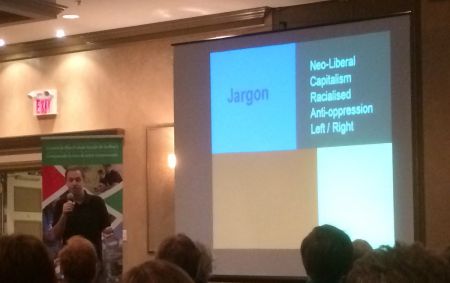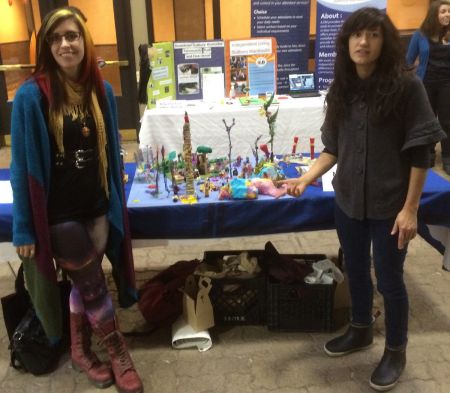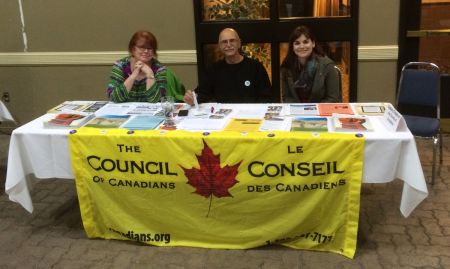Toronto-based community organizer Dave Meslin – a self-described "shit disturber" – was brought to Sudbury by the Social Planning Council (SPC) this past Wednesday to headline a day-long series of events focused on creating a culture of participation in the city. A range of organizations, groups, and individuals took part, representing a spectrum of visions for what "participation" might mean.
In both his three-hour afternoon workshop and his presentation in the evening, the focus for Meslin was community engagement, from talk of the barriers that people face, to impressive success stories, to grounded strategizing for how to “get the masses off their asses.”
He was very clear: "Apathy doesn't exist. Everyone cares about things and will invest time and energy and passion in the things they care about." Rather than being attributable to some "internal" flaw in individuals, he argued that lack of public participation is actually "external" and due to "a complex web of cultural and social barriers that go out of their way to perpetuate disengagement" and that amounts at least some of the time to "intentional exclusion." Many people don't participate in the public life of their community because of having been actively "separated from the processes" that shape their everyday lives -- that is, from decisions that determine everything from the quality of the air they breathe, to the frequency of buses on their street, to how hard it is to access the childcare they need, to a million other things.
Barriers to participation identified in the workshop included material pressures, such as lack of money, the need to work long hours at waged work, and the demands of caring for elders and children. Others he identified as "cultural," such as a tendency to "want people at podiums to tell us the answers" and "excessive reverence" for authority figures rather than an enthusiasm for shaping answers ourselves. And some are as simple-yet-pervasive as the alienating language used not only by governments and non-profit agencies, but also by many grassroots activist groups.
According to Janet Gasperini, executive director of the SPC, the day was timed to celebrate a number of milestones for her organization – its 25th birthday, the launch of a new division shifting the fee-for-service side of their community work into a more deliberately implemented social enterprise, and the launch of a new website.
Along with the workshop and talk by Meslin, the day also featured what the SPC called a "cool ideas fair," in which groups and organizations in the community set up displays and talked with attendees about the “cool ideas” they were already pursuing to build a more participatory culture in the city.
Participants in the day's events included staff members from well-established social service organizations in the city and from the municipal government itself, as well as a handful of former, current, and aspiring municipal politicians. However, organizations with more grassroots orientations were also involved. The significantly different ability to be responsive to active participation on the part of organizations whose primary accountability must be to funders versus in organizations responsible only to their own members was not explored in any detail in the conversation, but a number of the more grassroots groups in attendance seemed to take the idea of “participation” in more far-reaching directions.
Myths and Mirrors Community Arts is an organization that has done arts-based organizing in the city for almost two decades. According to administrative coordinator Blaire Flynn, the group wanted to showcase both their new artist-in-residency program as well as some commmunity-produced art that is the first step in an arts-based process to "reimagine," "reinvigorate," and "reengage" with community space in Victory Park, where the organization has had a presence for many years.
Dani Taillefer, the new artist-in-residence intern with Myths and Mirrors, appreciated the workshop with Meslin because it left her with "a lot of great ideas on how to engage with the community" as she defines her role with the organization and figures out how to go about working in arts-based ways with the community around Victory Park. She said that some participants in the workshop seemed to be thinking about participation as mainly about "engaging" people -- drawing people's attention to a particular issue or action, and perhaps changing some aspect of their behaviour -- while others, including her, were more intent on figuring out how to catalyze "interaction," which for her means a more sustained sort of relationship and involvement.
June Davis is a member of the Louis Street Community Association, "a nonfunded community grassroots organization" based in a social housing complex. They have been doing a lot of work with arts among folks in their neighbourhood to "inspire and empower." She says that people in her community have to deal with a lot of stigma because of poverty and because of living in social housing, and that actually "trusting a lot of those agencies these people in the community have to deal with" that regulate their lives and access to resources is a major barrier to participating in community processes. Nonetheless, she wants to make it possible for "each and every one of us" to "share ideas and give solutions."
André Clément was present as a member of the new chapter of the Council of Canadians in Sudbury. The Council is a national organization that has worked for three decades on issues as diverse as climate change, free trade, the right to water, and the erosion of democracy in Canada, but the Sudbury chapter was founded just last month. He was very blunt about valuing a culture of participation as part of a sweeping vision for change: "We can't leave the resolution of our different issues up to existing authorities such as the governments in power."
For Meslin, one of the key features keeping most people from participating is a sense that it really isn't their place to do so. To solve that, he said, we need to cultivate "a sense of collective ownership over the commons," by which he means not only physical public space but also public services and various other public and common goods. "The world is a co-op and every one of us is a member," he said.
Scott Neigh is a writer, activist, and media producer based in Sudbury, Ontario. He is the host of Talking Radical Radio and the author of two books of Canadian history told through the stories of activists. He participated in the workshop and "cool ideas fair" on behalf of the Sudbury working-group of The Media Co-op.



